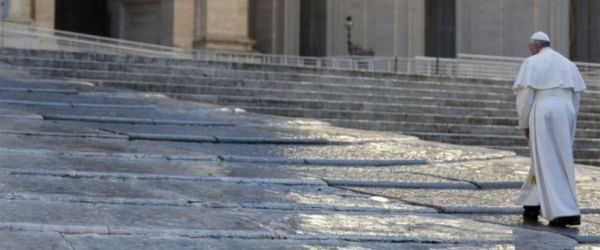The passage of the Gospel which we have heard presents to us a scene set in the Temple of Jerusalem, at the culmination of the Jewish Feast of Tabernacles, after which Jesus proclaimed a great prophecy revealing himself as the source of “living water”, that is, the Holy Spirit (cf. Jn 7:37-39). Then the people, deeply impressed, begin to talk about him. Today people are still talking about him. Some are excited and say: “This is really the prophet” (v. 40). Someone even says: “This is the Christ” (v. 41). But others reject that by saying that the Messiah does not come from Galilee, but from the line of David, from Bethlehem; and thus, without knowing it, they confirm the very identity of Jesus.
The chief priests send guards to arrest him, as do dictators, but they return empty-handed, saying: “No man ever spoke like this man!” (v. 46). There, that is the voice of truth, which resounds in the simple people.
The Word of the Lord, yesterday as today, always provokes division: the word of God divides, always! It makes a distinction between those who accept it and those who refuse. Sometimes an interior contrast sparks in our heart; this happens when we experience the charm, the beauty and the truth of the words of Jesus, but at the same time we reject them because they call us into question, they put us in difficulty and they cost us too much to observe them.
Today I have come to Naples in order to proclaim together with you: Jesus is Lord! But I don’t want to say it alone: I want to hear it from you, from everyone, now, all together: “Jesus is Lord!”, one more time: “Jesus is Lord!”. No one speaks like He does! He alone has words of mercy that can heal the wounds of our heart. He alone has words of eternal life (cf. Jn 6:68).
Christ’s word is powerful: it doesn’t have the world’s power, but God’s, which is strong in humility, and in weakness. His power is that of love: this is the power of the word of God! A love that knows no boundaries, a love that lets us love others before ourselves. The word of Jesus, the holy Gospel, teaches that the truly blessed are poor in spirit, non-violent, meek, workers of peace and justice. This is the force that changes the world! This is the word that gives strength and is capable of changing the world. There is no other way to change the world.
The word of Christ wants to reach all people, in particular those who live in the peripheries of existence, so that they may find in Him the centre of their life and the source of hope. And we, who have had the grace to receive this Word of Life — it is a grace to receive the word of God! — we are called to go, to come out from behind our fences and, with zealous hearts, to bring to all the mercy, the tenderness, the friendship of God: this is a job that pertains to everyone, but in a special way it pertains to you priests. To bring mercy, to bring pardon, to bring peace, to bring joy through the Sacraments and through listening. That the people of God may find in you men who are merciful like Jesus. At the same time that every parish and every ecclesial reality may become a sanctuary for the one who seeks God and a welcoming home for the poor, the elderly and those who find themselves in need. To go and to welcome: so that the heart of Mother Church, and of all her children, will beat. Go, welcome! Go, seek! Go, bring love, mercy and tenderness.
When hearts are open to the Gospel, the world begins to change and humanity is resurrected! If we welcome and live the word of Jesus every day, we are resurrected with Him.
The Lent we are living makes this message echo in the Church, as we journey towards Easter: the hope of resurrecting with Christ, our Saviour, is rekindled in the people of God. May the grace of this Easter not be in vain for the people of God, of this city! May the grace of Resurrection be accepted by each one of you, so that Naples may be filled with the hope of Christ the Lord! Hope: “Make way for hope”, this is the motto of my visit. I say it to you all, in a special way to young people: open yourselves to the power of the Risen Jesus, and you will bear the fruits of new life in this city: the fruits of sharing, reconciliation, service and brotherhood. Allow yourselves to be enveloped and embraced by his mercy, by the mercy of Jesus, by that mercy which only Jesus gives us.
[Pope Francis, homily Naples 21 March 2015]












